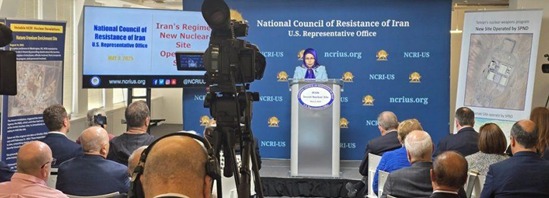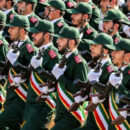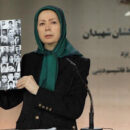Have Iran’s Mullahs Reached a Tipping Point with West

Have Iran’s Mullahs Reached a Tipping Point with West Over Their
Attacks on Commercial Shipping?
Townhall | Struan Stevenson | Dec. 2, 2023
Since the start of the Israel-Hamas war on Oct. 7, the Iranian-backed Houthi rebels in Yemen have stepped up their drone and missile attacks on cargo vessels in the Red Sea, forcing major firms to take the longer, costlier route around the southern tip of Africa. According to the Pentagon, the Houthis have launched more than 100 such attacks, targeting shipping from at least 35 different countries. The Houthis have been trained and armed by the Islamic Revolutionary Guards Corps (IRGC), the Iranian regime’s main military force. Kamikaze drones manufactured in Iran have been used in the attacks.
Now, in a threatening escalation, the Pentagon has claimed the Iranians were behind a Dec. 23 drone attack on the MVPluto ship, a chemical tanker flying the Liberian flag and operated by a Dutch entity. The ship is owned by a Japanese company. The drone, which according to the Pentagon was fired from Iran, exploded above the tanker in the Indian Ocean, 200 nautical miles off the Indian coast, causing a fire and some damage, although no casualties were reported. The mullahs’ regime has now threatened to use similar attacks to close the Strait of Gibraltar to shipping unless the Israelis call a ceasefire in Gaza. A senior IRGC official, Mohammad Reza Naqdi, told Iran’s state-controlled Tasnim news agency that Iran could force the closure of other major sea routes unless Israel halted its war with Hamas. “With the continuation of these crimes, America and its allies should expect the emergence of new resistance forces and the closure of other waterways,” he said.
Reacting to the increasing threat, the US warship Laboon has shot down four Kamikaze drones fired from Yemen by the Houthis. Another drone narrowly missed a Norwegian-flagged tanker, and one more struck the MV Saibaba, an Indian-flagged tanker in the Red Sea, in the run-up to Christmas. The Biden administration has accused Tehran of being “deeply involved” in planning the attacks, claiming that its intelligence was a critical factor enabling the Houthis to target commercial shipping in the Red Sea. Now more than 20 countries have joined a US-led multi-national Red Sea coalition with the objective of protecting international shipping in the zone. Major General Pat Ryder, a Pentagon spokesman, told journalists that the Houthis were “attacking the economic wellbeing and prosperity of nations around the world,” effectively becoming “bandits along the international highway that is the Red Sea.” He said that the coalition forces will “serve as a highway patrol of sorts, patrolling the Red Sea and the Gulf of Aden to respond to – and assist as necessary – commercial vessels that are transiting this vital international waterway.”
This move has caused panic in Tehran, where the regime’s foreign minister, Hossein Amir-Abdollahian, rushed to assure the Americans that the Houthis were acting unilaterally, without the knowledge or involvement of Tehran. “We have explicitly told the Americans that these groups and Yemen act based on their own assessments and interests, and we have never ordered them to take action,” he claimed. His denials have had a hollow ring, however, given the fiery rhetoric expressed routinely during Friday prayers in the Islamic Republic, where IRGC commanders have cried “Death to America” and “Death to Israel.” In a speech last week, the regime’s Supreme Leader, Ayatollah Ali Khamenei said: “America is a definite accomplice of criminals. The United States is in some way directing the crime that is being committed in Gaza.” He claimed the hands of Americans “were tainted with the blood of the oppressed, children, patients, women and others.”
With thousands of Palestinians killed so far in Gaza by the Israelis, with arms often supplied by the Americans and Europeans, there is a danger that the war could explode into a wider conflict across the Middle East and beyond. Already Israel has had to fight off attacks by Hezbollah in Lebanon, with the threatening potential of opening a second front in the ongoing war. There are also signs of growing tension in the West Bank, where more than two million Palestinians have watched in horror at the massacre of their sisters and brothers in Gaza and support for Hamas has soared. Since the start of the Gaza conflict the Israeli military has mounted frequent raids on the West Bank in an attempt to subdue militants, fueling support for armed resistance groups in the occupied territory.
Khamenei and his president, Ebrahim Raisi, known as ‘The Butcher of Tehran’, for his involvement in the 1988 massacre of over 30,000 political prisoners, had hoped that the Hamas conflict in Gaza would serve as a welcome distraction from rampaging poverty, misogyny and punitive repression at the hands of their regime in Iran. They have been keen to fan the flames of the Israel-Gaza war to maintain instability in the region, so that it can be used to serve the distorted theocratic ideology of the Iranian regime. However, they are also well aware that their involvement in arming, training and directing militant Islamists across the Middle East, while neglecting spiraling deprivation in their own country has caused huge resentment among the 75 million population.
Determined to thwart another nationwide uprising like that which occurred following the death in custody of Mahsa Amini, the mullahs have endorsed a frenzy of executions and arrests. More than 700 people have been executed this year, many of them young male and female political prisoners detained during the protests. Desperately clinging to power, the mullahs now fear that their support for Hamas in Gaza, Hezbollah in Lebanon, the Shi’ia militias in Iraq and Bashar al-Assad in Syria, may have reached a tipping point with America and its western allies. Tehran’s tactics of nuclear weapons blackmail, the hostage-taking of foreign citizens, and the suppression of the Iranian people, may have backfired. Resistance units of the main popular opposition movement – the Mojahedin-e Khalq (MEK), have burgeoned across Iran, offering a clear vision for a democratic future of freedom, justice, human rights, women’s rights, an end to the death penalty and an end to the nuclear threat.
The West will not tolerate further Iranian attacks on commercial shipping in the Red Sea, or threats of militant action in the Mediterranean. The only way to prevent an escalation of the Israel Gaza war and the spread of terror and Islamic fundamentalism across the Middle East, is for the West to back the Iranian people and their MEK resistance movement, in their bid to overthrow the clerical regime.








